Iran's FM Arrived In Damascus Via Lebanon After Syria Airport Bombings
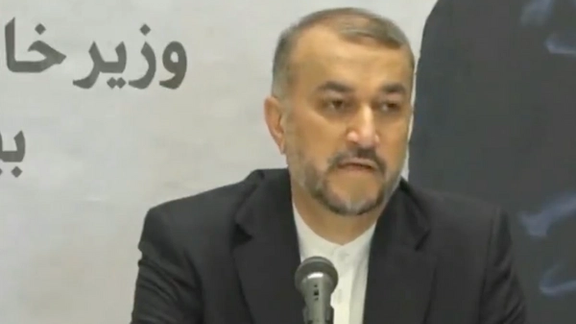
Iranian foreign minister Hossein Amir-Abdollahian entered Syria by the Lebanese land border Friday after two bombings this week closed Damascus and Aleppo airports.

Iranian foreign minister Hossein Amir-Abdollahian entered Syria by the Lebanese land border Friday after two bombings this week closed Damascus and Aleppo airports.
Allahkaram Moshtaghi, the political advisor of the Iranian embassy in Beirut wrote on X that Israel "imagined stopping the revolutionary diplomacy of the Islamic Republic if it hit Damascus and Aleppo airports", but after meeting with senior Lebanese officials he has entered Syria through the land border of Lebanon.
Israeli missiles targeted the airports in the Syrian capital Damascus and Aleppo on Thursday, damaging their runways, according to Syrian military sources. The Israeli military does not comment on such reports.
As part of its ongoing operations against Iran-linked proxies in Syria, Israel has long targeted the Aleppo and Damascus airports. It has been reported that strikes on these airports are intended to disrupt Iranian supply lines to Syria, where Tehran has grown in influence since it began supporting President Bashar al-Assad in the 2011 civil war.
Amir-Abdollahian is on a regional tour that took him to Baghdad and Beirut where he warned that the Hamas-Israel conflict could spread to other parts of the Middle East if Israel's attacks on Gaza do not cease immediately.
The Iranian regime celebrated Hamas' bloody attack on Israel that killed well over 1,000 civilians and led to an ongoing war between Israel and Hamas.
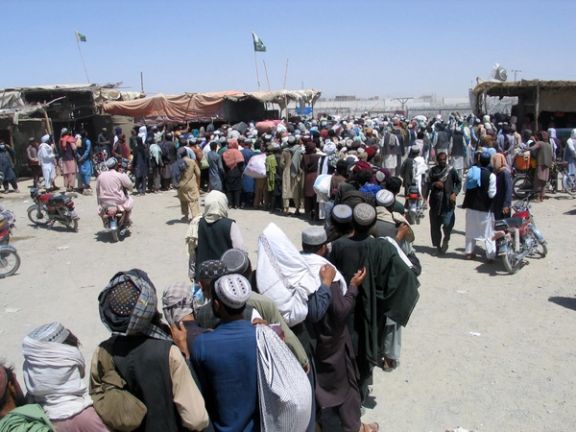
Indiscriminate violence against Afghan migrants earlier this month has led to serious concerns of escalation of maltreatment of Afghans in Iran in the coming days.
At least three major instances of violence against Afghans have been reported on social media where the hashtag “Expulsion of Afghans a National Demand” was used to promote Anti-Afghan immigrants’ views.
A large crowd of Iranians on October 6 staged a protest rally outside the local council’s office in Eghbaliyeh, a town of 55,000 in Qazvin Province, wielding sticks and chanting that Afghans should be expelled from Iran. A video posted on social media also showed a small mob of mainly youngsters attacking the homes of the town’s Afghan residents and throwing stones at their windows.
A local police official, Brigadier General Ali Ebrahimi, said that police had arrested nineteen individuals for the violence. Social media users, however, reported the injury of several Afghans. They also claimed police did not take any action to protect the homes of the Afghans during the incident.
A video Iran International TV received on October 7 also showed two Afghan teenagers being treated at a Tehran hospital allegedly after being attacked and wounded by knife. The same video shows a third young Afghan man in the corridors of the same hospital saying he was also stabbed.
The narrator of the video blames the Islamic Republic for allowing mistreatment of Afghans and claims there have been many more similar instances of attacks on Afghans recently.
In another video posted on social media several Iranians are seen assaulting a young Afghan man in Sanandaj, the capital of the western province of Kurdistan where the number of Afghan immigrants has never been high compared to some other regions such as Tehran and eastern provinces. The attacker who is wielding a saber is heard in the video demanding that the Afghan man say he will never set foot in Sanandaj again.
In the past few weeks the government’s political rivals have repeatedly warned about its “open borders” policy and the possibility of hidden agenda with hardliners responding to such criticism by accusing critics of inciting “Afghan-phobia” amid fast-growing anti-Afghan sentiments on social media and violence against the immigrants.
The Islamic Republic adopted an unprecedentedly lenient approach to immigration of Afghans when hardliner President Ebrahim Raisi took office in Iran two years ago and anti-American Taliban formed a government in neighboring Afghanistan.
Some government critics claim authorities are actively encouraging the growth of the Afghan population with incentives such as subsidized energy and food to remedy the problem of population decline or even to bolster its military by recruiting young Shiite Hazara Afghans.
The Revolutionary Guards linked Fars news agency has accused a “shadowy political group” of seeking to cause tension between the Islamic Republic and the Taliban by raising an alarm about the growth of the number of Afghans in the country since the Taliban took over Afghanistan two years ago.
Heshmatollah Falahatpisheh, a former conservative lawmaker and chairman of the parliament’s foreign policy and national security committee is one of the politicians who has repeatedly warned about the security problems that may emerge from increased Afghan immigration in recent months.
Falahatpisheh claims that there is a “mafia” that financially benefits from Afghan immigration. “There is a confluence of trafficking of commodities, narcotics, humans and fuel in eastern borders whose interests are intertwined and have practically blocked the policy of blocking and management of the borders,” he told the reformist Ham-Mihan newspaper Sunday. “As a person who used to have official responsibility for field investigation in eastern borders, I must point out the reality. The country is facing a serious threat to its national security and interests.”
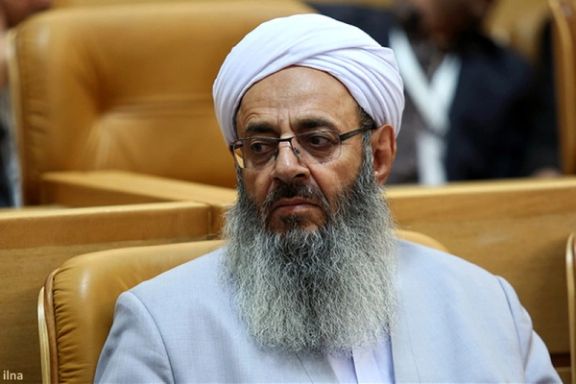
The outspoken leader of Iran's Sunnis has contradicted the government, stating that the obliteration of Palestinians and Israel's annihilation are unattainable.
Mowlavi Abdolhamid, the Friday Prayer Imam in Zahedan, used his weekly sermon to condemn attacks on civilians without specifically mentioning the militant group Hamas. He stressed that blind allegiance to Islamic groups does not have his approval, affirming, "Extremism from any quarter, when it entails harm to people or children, is unacceptable to us."
Simultaneously, he expressed concern about the current humanitarian situation in Gaza as a consequence of Israel's response to the attacks. The Sunni leader endorsed the concept of a two-state solution for the Palestinian issue, emphasizing the need for a just resolution to the current crisis.
He added, "The reality is that neither Muslims nor Israel, can achieve the destruction of the other one. It's an unattainable goal. Why resort to force when the objective is unattainable?”
His remarks stand in contrast to the stance of the Islamic Republic, which has consistently advocated for the "destruction" of Israel, effectively rejecting the notion of a two-state solution.
In a 2011 conference in Tehran, Iran's ruler Ali Khamenei declared, "Any plan that seeks to divide Palestine is destined for failure."
Iranian authorities exploit every opportunity to underscore the imperative of Israel's "destruction," a slogan that has been accompanied by substantial financial support for militant groups like Hamas and Hezbollah.
However, in the wake of widespread global criticism of Hamas's attack on Israeli territory, Ali Khamenei distanced Iran from the surprising assault in his initial official response.
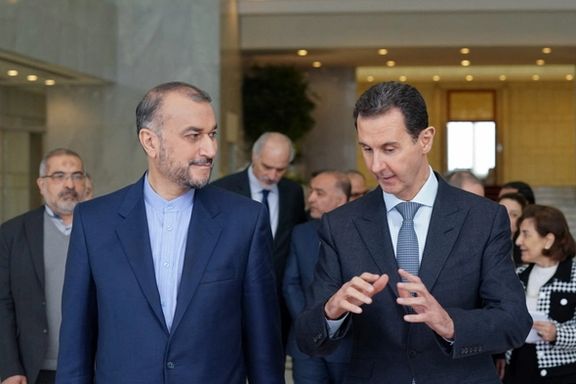
Iran’s Foreign Minister Hossein Amir-Abdollahian has once again claimed that Hamas’ attack on Israel was a purely “Palestinian operation”, although Iran supports the group.
Amir-Abdollahian who was meeting Syrian President Bashar al-Assad in Damascus as part of a regional tour, was quoted as saying that Iranian and Syrian support for the Palestinians is not a secret, but repeated Tehran’s position that it was not directly involved in the attack.
Hamas launched a surprise invasion of southern Israel on October 7, using thousands of forces who killed well over 1,000 Israeli civilians, prompting a siege of Gaza and relentless Israeli bombing of targets in the Palestinian enclave.
The Iranian regime immediately congratulated Hamas, calling the attack a heroic act and organizing street celebration. However, as governments and international media asked if Tehran had a role, Supreme Leader Ali Khamenei tried to distance the regime, saying the attack was a Palestinian operation.
Amir-Abdollahian also told Assad that “the resistance is capable of resisting against the Zionist regime for a long time.”
The Islamic Republic uses the term “Resistance Front” to refer to many of its proxy militant armed groups around the region, and the Syrian regime. Lebanese Hezbollah and Hamas are the largest of these groups receiving hundreds of million dollars a year from Iran, in addition to weapons and training.
The Israeli military has surrounded the Gaza Strip with the aim of an eventual ground operation that according to officials is aimed to eliminate Hamas as a fighting force. Hundreds of thousands of Gazans have been told by Israel to evacuate to safer areas to reduce civilian casualties.
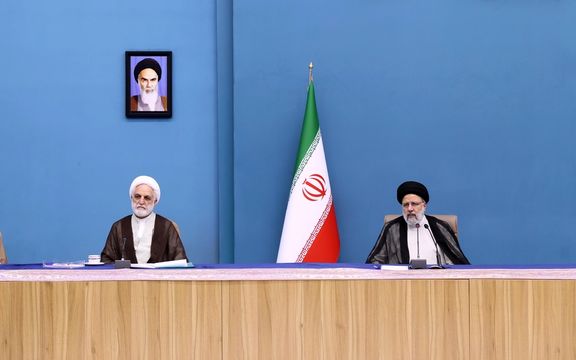
A prominent politician in Tehran has suggested that President Ebrahim Raisi may seek another review of four bills allowing Iran to join the FATF conventions.
The FATF (The Financial Action Task Force) is a G-7 initiative to combat money laundering and financing terrorism. The four bills stuck in Iran's legislative system since 2017 due to opposition by hardliners include measures to join the convention against organized crime, to amend “the anti-money laundering law,” to accept the convention against financial support for terrorism” and a “bill to amend the law against financial support for terrorism.”
The former head of the Iranian parliament's national Security and Foreign Relations Committee Heshmatollah Falahatpisheh also told Etemad Online that "if it is true that Raisi has now asked Supreme Leader Ali Khamenei to order the Expediency Council to start another review of the FATF bills, then we should be sorry for the country's national interests as Raisi was one of the opponents of the bills."
The bills were handed over to the Expediency Council, a group of former officials trusted by Khamenei, for review after it changed hands between the parliament (Majles) and the constitutional watchdog the Guardian Council without any progress.
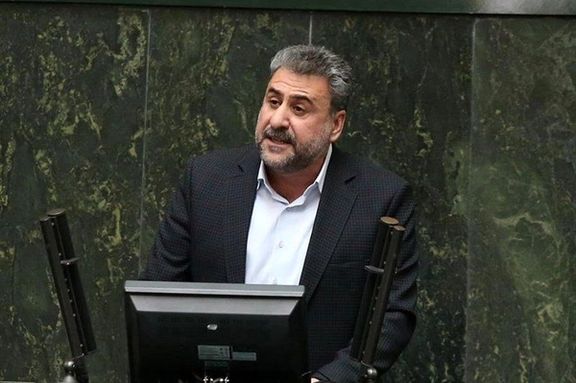
In addition to the limitations imposed on Iran's international trade and banking due to US and other international sanctions, adherence to the FATF conventions is essential for international traders. It provides assurance that the funds used by Iran in transactions will not be funneled into money laundering, cross-border organized crime, or terrorism financing.
Hardliners, however, have been strictly opposing the bills saying openly that joining the conventions would bar Iran from sending money to groups such as Hamas, Islamic Jihad and Hezbollah, designated as terrorist groups by key countries.
Falahatpisheh charged that hardliners have been benefitting from illicit trade and financial transaction while Iran has been on the FATF blacklist. He added that Raisi strongly opposed the bills as an Expediency Council member and the head of Iran's Judiciary. He said that Raisi as President has now realized that joining the FATF and returning to the nuclear deal with the West are necessary to improve Iran's ailing economy.
Meanwhile, Expediency Council member Mohammad Sadr also acknowledged in an interview on Wednesday that "many of the opponents of the JCPOA and FATF have realized the significance and necessity of the nuclear agreement and the anti-money laundering conventions.
Sadr emphasized that without the FATF, Iran's existing economic challenges will remain unsolved, and the system is susceptible to encountering new issues.
Some politicians and many commentators and economists have been insisting that passing the bills are essential for conducting financial transactions with the world. Many had also pointed out that even if the sanctions are lifted, Iran will not be able to conduct international trade and banking without accepting the terms of the FATF.
Iran's radicals and hardliners are being blamed for the impasse in the country's economy, politics and foreign policy while almost everyone knows that all the decisions originate with Khamenei and dictated to the system. However, former Reformist politician Jalil Rahimi Jahanabadi has called for a powerful reformist minority at the Majles to counterbalance hardliners.
He said: "We need to harness and control the radicals. A powerful reformist minority can have a good impact on the Majles." It is interesting that the reformist figure is happy only if a minority comes from the reform camp rather than demanding to win the majority in parliament.
Raisi had called for debating the FATF and JCPOA before leaving for New York to take part in the UN General Assembly in September, however, the issue popped up again after the brutal Hamas attack on Israel last week. Iran finds itself in the crosshairs of international criticism for being the main supporter of Hamas. Khamenei was forced to say publicly that the regime played no direct role in the attack.

A wave of anti-Israeli remarks came on Friday from authorities in Iran days after a surprise attack by Hamas on Israel that killed and injured thousands.
Hassan Rouhani, the former Iranian president, has issued a statement condemning Israel for declaring an all-out war against Hamas in Gaza where the militant Hamas group has its base.
Rouhani said that the current situation highlights the “suffering” endured by the “people of Palestine” inflicted by Israel’s “Zionist Regime for the past 75 years.”
The state of Israel was established in 1948 and recognized by the United States at the same time.
“Censorship of the truth, one sided accounts of events, and political and media repression,” Rouhani mentioned as examples of what the Palestinian people have had to deal with.
The former President's remark contrast with the behavior of the Iranian regime that has denied basic freedoms to Iranians for 44 years. It has killed thousands of protesters in recent years and jailed tens of thousands of people, in addition to thousands who have been hanged.
Meanwhile, a representative of Iran’s ruler Ali Khamenei in the southwest province of Khuzestan has also issued remarks praising Hamas’s attacks on Israel.
Abdolnabi Mousavi-Fard claimed that any scene of Hamas fighters using violence against Israeli civilians is fabricated. “My regret is that some people think Israelis are innocent,” he added.
The Islamic Republic is the main supporter of Palestinian militant group such as Hamas, leading to speculation about Iran’s direct involvement in the October 7 attack.